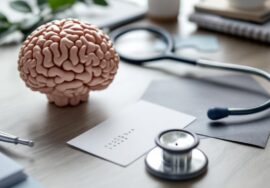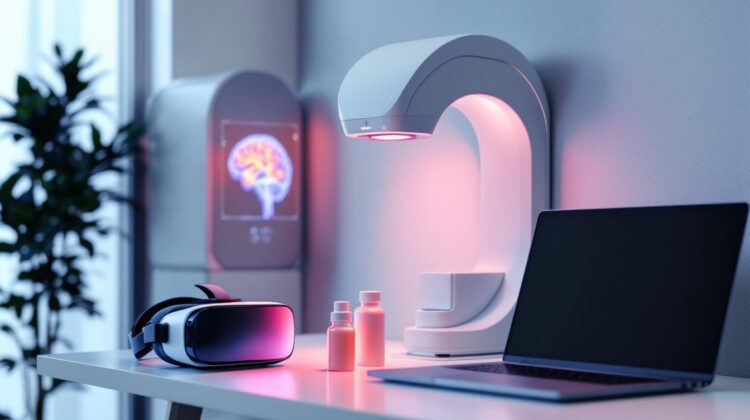
Cutting-Edge Treatments for Depression
Depression treatment has come a long way in recent years. At Diligence Integrated Care, we’re excited to share the newest treatments for depression that are transforming lives.
From innovative therapies to personalized approaches, these cutting-edge methods offer hope to those struggling with this challenging condition. In this post, we’ll explore groundbreaking treatments and integrative strategies that are reshaping the landscape of depression care.
Revolutionizing Depression Treatment
Depression treatment has evolved significantly in recent years. New therapies offer hope for those who haven’t found relief through traditional methods. At Diligence Integrated Care, we provide our patients with the most effective, cutting-edge treatments available.
Ketamine and Esketamine: Rapid Relief for Treatment-Resistant Depression
Ketamine and its derivative, esketamine, have emerged as game-changers in depression treatment. These medications target the brain’s glutamate system rather than serotonin. This unique mechanism allows for rapid symptom relief, often within hours or days (compared to weeks or months with conventional treatments).
Esketamine, administered as a nasal spray under the brand name Spravato, received FDA approval in 2019 for treatment-resistant depression. Dr. Bolanle Oluwadara, MD, at Diligence Integrated Care has observed remarkable results with esketamine therapy. Patients report significant mood improvements after just a few sessions, with effects lasting longer than traditional antidepressants.
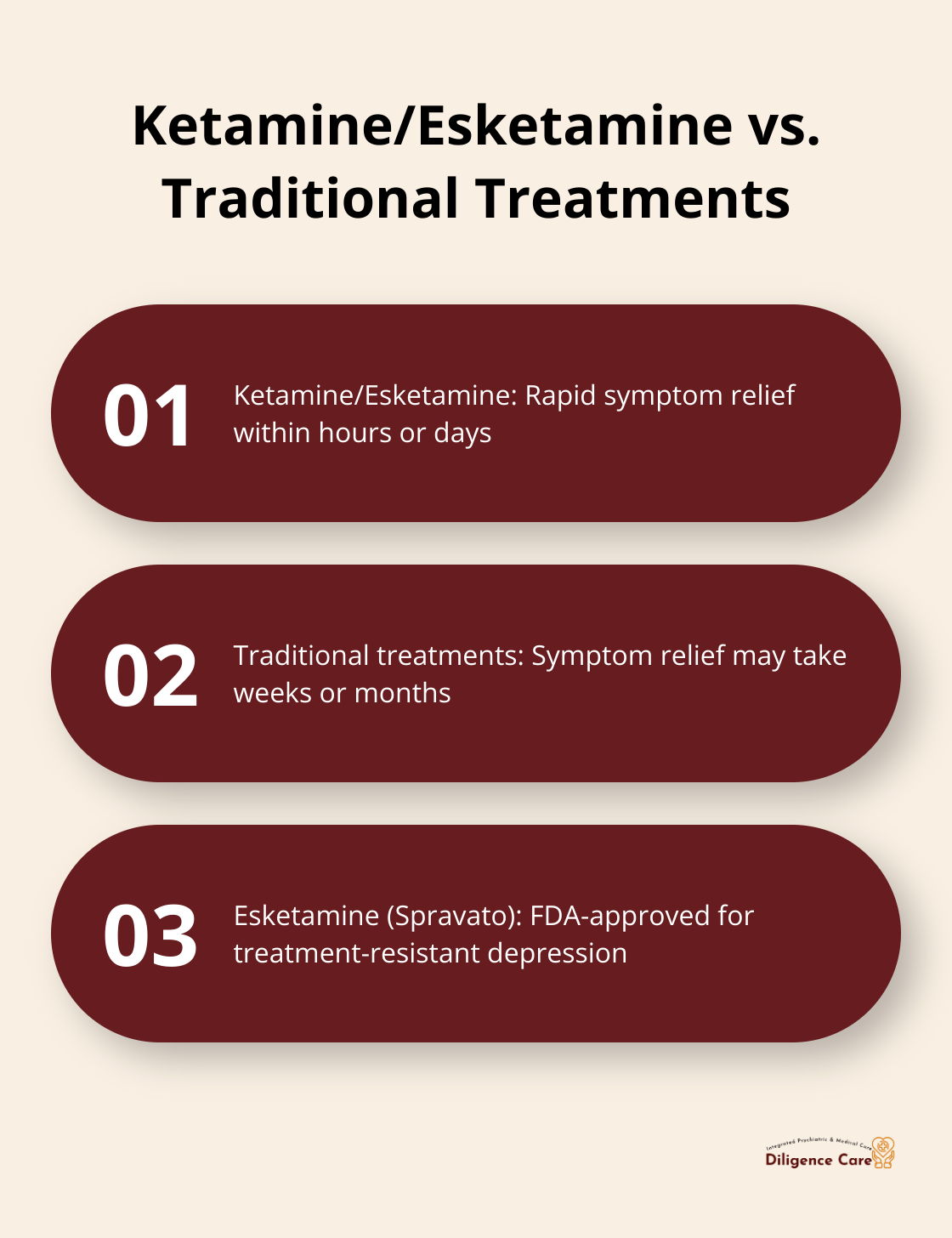
Transcranial Magnetic Stimulation: Non-Invasive Brain Stimulation
Transcranial Magnetic Stimulation (TMS) is a non-invasive procedure that uses magnetic fields to stimulate specific brain areas associated with mood regulation. The FDA has approved TMS for treatment-resistant depression, and clinical studies show impressive results.
Bernadette Akpengbe, PMHNP-BC, FNP-BC, leads the TMS program at Diligence Integrated Care. TMS sessions typically last about 40 minutes and occur five days a week for four to six weeks. Unlike medication, TMS doesn’t cause systemic side effects, making it an attractive option for many patients.
Deep Brain Stimulation: A Surgical Approach to Severe Depression
For patients with severe, treatment-resistant depression, Deep Brain Stimulation (DBS) offers a potential solution. This surgical procedure involves the implantation of electrodes in specific brain areas to regulate mood-related neural circuits.
While DBS remains experimental for depression, early studies show promising results. Dr. Chijioke Iwuchukwu, MD, at Diligence Integrated Care, closely monitors DBS research and can discuss its potential benefits with eligible patients.
Psychedelic-Assisted Psychotherapy: Exploring New Frontiers
Psychedelic-assisted psychotherapy, particularly using psilocybin (the active compound in “magic mushrooms”), has gained attention in depression treatment. Clinical trials have shown significant reductions in depression symptoms after just one or two psilocybin sessions combined with psychotherapy, although it’s not yet FDA-approved.
Tony Akpengbe, DNP, at Diligence Integrated Care, actively follows research in this area and can provide information on ongoing clinical trials for interested patients.
These innovative treatments represent a new era in depression care. They offer hope to those who haven’t found relief through traditional methods. As we move forward, personalized medicine in depression care promises to further revolutionize treatment approaches.
Tailoring Depression Treatment to You
At Diligence Integrated Care, we believe personalized medicine represents the future of depression treatment. We’ve moved beyond one-size-fits-all approaches. Today, we use cutting-edge technologies and scientific advancements to create treatment plans tailored to each individual’s unique biological and psychological profile.
Genetic Testing: Your Medication Response Blueprint
Genetic testing has transformed how we prescribe antidepressants. Pharmacogenomic guided medication enhances remission and response rates. This approach, known as pharmacogenomics, helps us select the most effective treatment with fewer side effects.
Dr. Bolanle Oluwadara, MD, at Diligence Integrated Care, uses genetic testing to guide medication choices. For example, variations in the CYP2D6 gene can affect how quickly your body metabolizes certain antidepressants. Knowing your genetic profile allows us to adjust dosages or select alternative medications, potentially reducing the trial-and-error period often associated with finding the right antidepressant.
Biomarkers: Your Body’s Depression Signals
Biomarkers are measurable indicators in your body that can signal depression and guide treatment. By utilizing these neural biomarkers, clinicians can develop personalized treatment plans that target the specific neurobiological systems involved in their patients’ depression.
For instance, high levels of cortisol (often called the stress hormone) can indicate a type of depression that might respond better to specific treatments. Measuring cortisol levels through a simple blood test allows us to tailor our approach more effectively.
AI-Driven Treatment Planning: Harnessing Data Power
Artificial Intelligence (AI) transforms how we plan depression treatments. AI algorithms analyze vast amounts of patient data to predict which treatments are most likely to succeed for individuals with similar profiles.
Eric Efuetngu, DNP, FNP-C, APRN, at Diligence Integrated Care, uses AI-driven tools to support treatment decisions. These tools consider factors like symptoms, medical history, lifestyle, and even social determinants of health to suggest the most promising treatment options.
AI doesn’t replace clinical judgment, but it provides valuable insights that help us make more informed decisions. This data-driven approach can lead to faster symptom relief and better long-term outcomes.
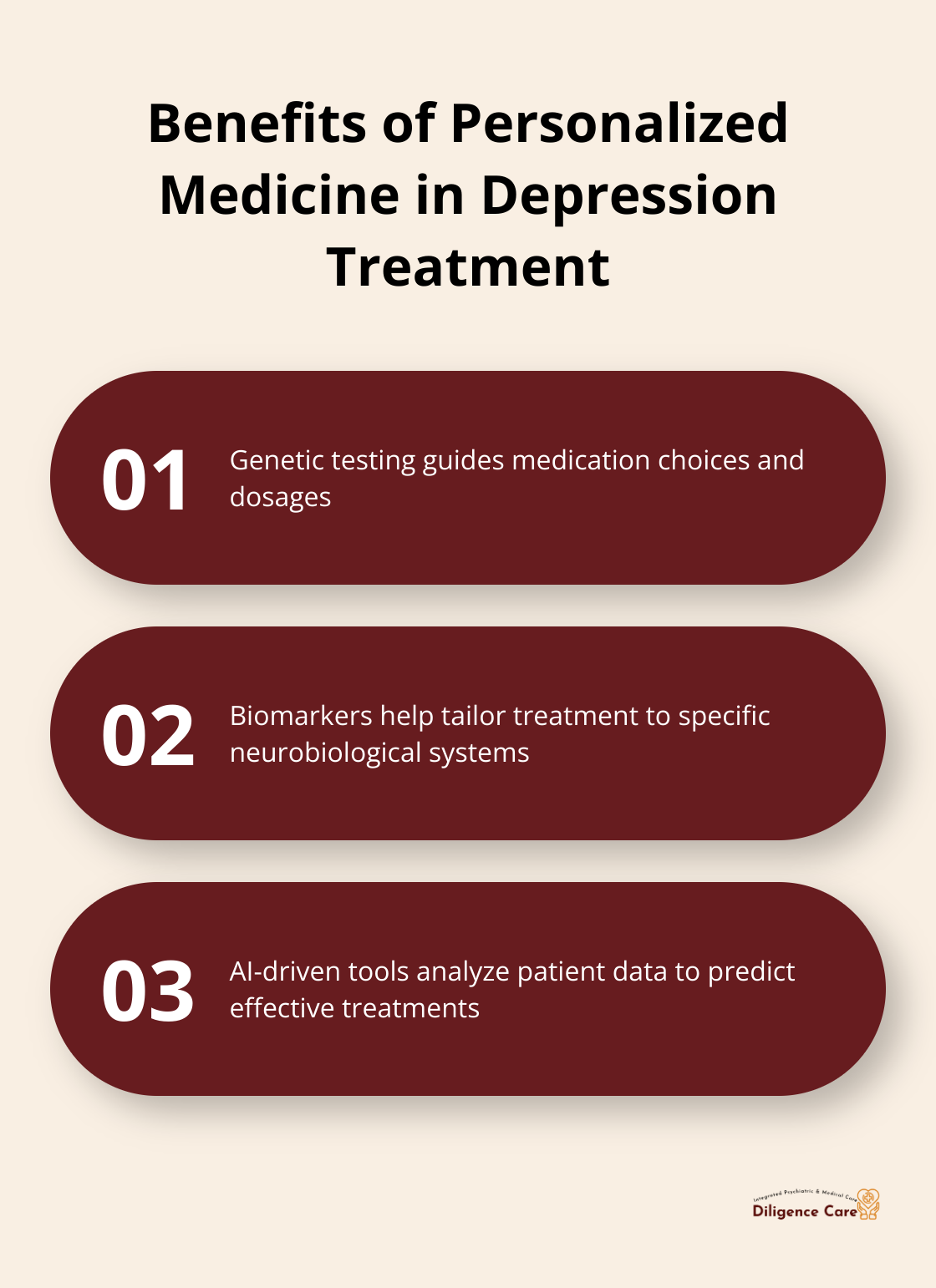
Tailored Therapy Approaches: Beyond Medication
Personalized medicine in depression care extends beyond choosing the right medication. It involves creating a comprehensive treatment plan that addresses all aspects of your mental health. We combine advanced techniques with our expertise to provide truly individualized care.
Mavis Efuetngu, PMHNP-BC, APRN, specializes in tailoring therapy approaches to each patient’s unique needs. This might include a combination of cognitive-behavioral therapy, mindfulness practices, and lifestyle interventions (such as diet and exercise recommendations).
As we continue to advance in personalized medicine, we move closer to a future where every person with depression receives a treatment plan as unique as they are. This personalized approach not only improves outcomes but also reduces the time and frustration often associated with finding the right treatment.
The next frontier in depression treatment lies in integrating these personalized approaches with holistic strategies that address both mind and body. Let’s explore how combining traditional and alternative therapies can create a comprehensive approach to managing depression.
Holistic Strategies for Depression Management
At Diligence Integrated Care, we embrace a comprehensive approach to treating depression. Our holistic strategies combine evidence-based treatments with lifestyle interventions to address the multifaceted nature of depression.
The Power of Combined Therapies
Combining medication with psychotherapy often yields the best results for our patients. This approach, known as combination therapy, addresses both the biological and psychological aspects of depression. Dr. Bolanle Oluwadara, MD, at Diligence Integrated Care, observes faster and more sustained recovery when patients receive medication paired with talk therapy.
A patient struggling with severe depression might start with an antidepressant to alleviate symptoms, while simultaneously engaging in cognitive-behavioral therapy to develop coping strategies. A network meta-analysis of randomized clinical trials reported greater symptom improvement with combined treatment than with psychotherapy alone.
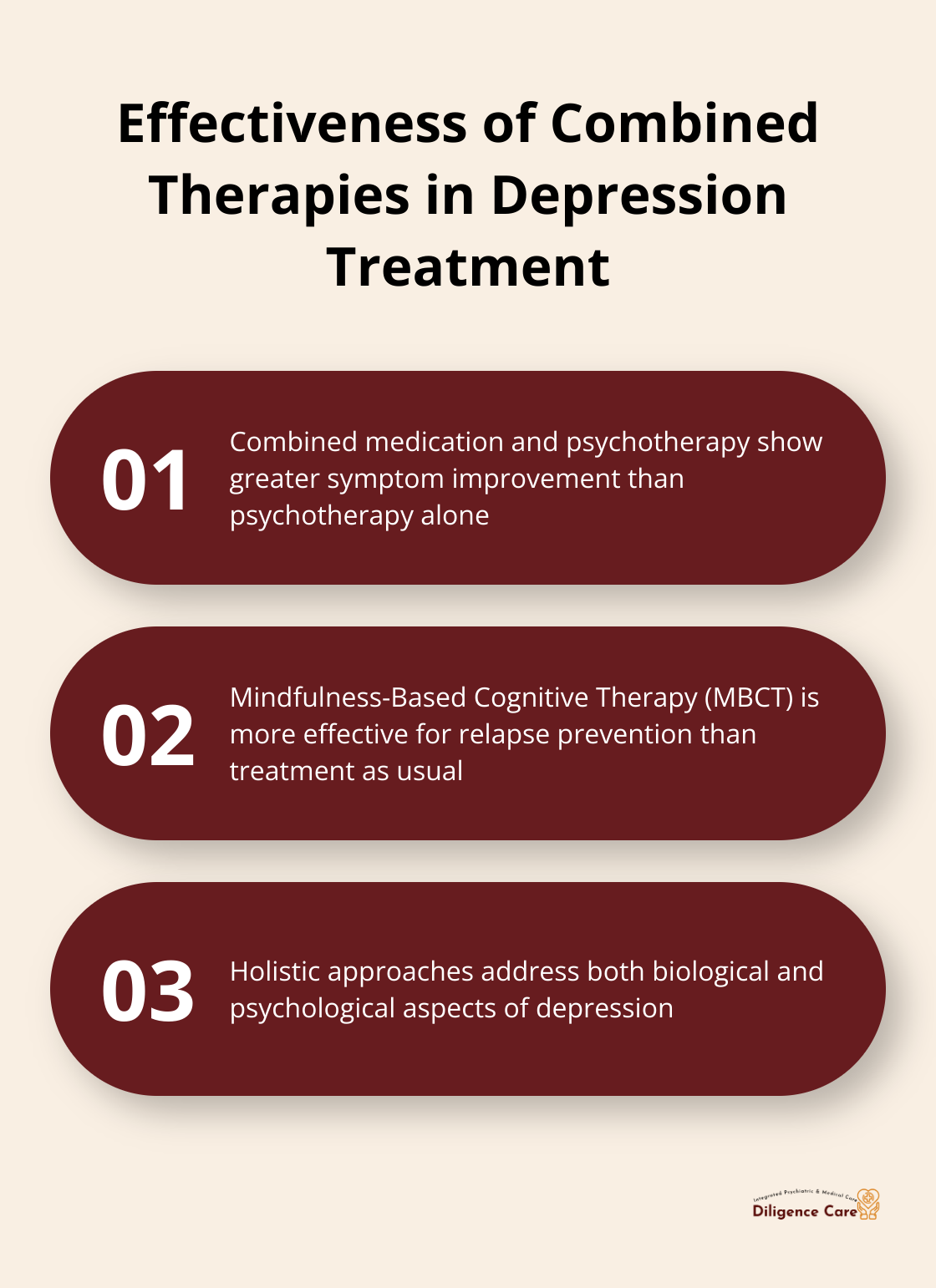
Mindfulness: A Powerful Tool Against Depression
Mindfulness-Based Cognitive Therapy (MBCT) has emerged as a potent weapon in our arsenal against depression. This approach combines cognitive therapy techniques with mindfulness practices to help patients break free from negative thought patterns.
Mavis Efuetngu, PMHNP-BC, APRN, at Diligence Integrated Care, leads our MBCT program. Systematic reviews on the use of MBCT for relapse prevention in patients with a history of MDD have reported that MBCT is more effective than treatment as usual in the long term.
The Role of Lifestyle in Depression Management
We cannot overstate the importance of lifestyle factors in managing depression. Diet, exercise, and sleep play vital roles in mood regulation and overall mental health.
Our team works closely with patients to develop personalized lifestyle plans. We might recommend a Mediterranean-style diet, rich in omega-3 fatty acids and antioxidants, which has been linked to a lower risk of depression.
Regular exercise, particularly aerobic activities, can be as effective as antidepressants for some people. We often suggest starting with a 10-minute daily walk and gradually increasing duration and intensity.
Sleep hygiene is another critical factor. We help patients establish consistent sleep schedules and create bedtime routines that promote restful sleep. Simple changes (like avoiding screens an hour before bed) can significantly improve sleep quality and mood.
Exploring Alternative Therapies
While we primarily rely on evidence-based treatments, we remain open to exploring alternative therapies that may complement traditional approaches. Acupuncture, for example, has shown promise in alleviating depression symptoms.
Herbal supplements like St. John’s Wort have also garnered attention. However, we always caution patients to consult with us before starting any herbal treatments, as they can interact with other medications.
Final Thoughts
Depression treatment has evolved rapidly, offering new hope for those who struggle with this condition. At Diligence Integrated Care, we provide our patients with the newest treatments for depression, combining innovative therapies with personalized care approaches. These cutting-edge methods (including ketamine therapy, TMS, and psychedelic-assisted psychotherapy) transform depression care, potentially helping patients who haven’t found success with traditional treatments.
Personalized medicine has become essential in effective depression treatment. We use genetic testing, biomarkers, and AI-driven planning to tailor treatment plans to each individual’s unique profile. This approach improves outcomes and reduces the time often associated with finding the right treatment.
Research in depression treatment continues to advance, with scientists exploring new therapeutic targets and refining existing treatments. We encourage you to explore the innovative options available if you struggle with depression. Our team at Diligence Integrated Care is ready to develop a personalized treatment plan that addresses your unique needs.




